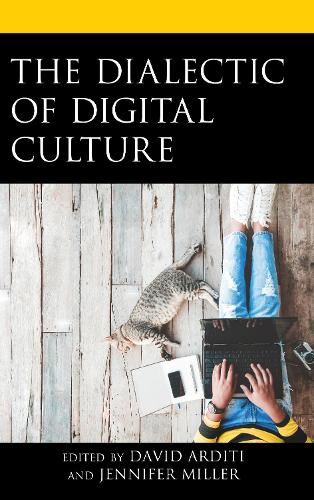
The Dialectic of Digital Culture
(Paperback)
Available Formats
Publishing Details
The Dialectic of Digital Culture
By (Author) David Arditi
Edited by Jennifer Miller
Contributions by David Arditi
Contributions by Brian Connor
Contributions by Lisa Daily
Contributions by Long Doan
Contributions by Robert Gehl
Contributions by Nancy Hanrahan
Contributions by Ariella Horwitz
Contributions by Douglas Kellner
Bloomsbury Publishing PLC
Lexington Books
18th October 2021
United States
Classifications
Professional and Scholarly
Non Fiction
303.4834
Physical Properties
Paperback
260
Width 154mm, Height 219mm, Spine 17mm
445g
Description
This edited collection analyzes the role of digital technology in contemporary society dialectically. While many authors, journalists, and commentators have argued that the internet and digital technologies will bring us democracy, equality, and freedom, digital culture often results in loss of privacy, misinformation, and exploitation. This collection challenges celebratory readings of digital technology by suggesting digital culture's potential is limited because of its fundamental relationship to oppressive social forces.
The Dialectic of Digital Culture explores ways the digital realm challenges and reproduces power. The contributors provide innovative case studies of various phenomenon including #metoo, Etsy, mommy blogs, music streaming, sustainability, and net neutrality to reveal the reproduction of neoliberal cultural logics. In seemingly transformative digital spaces, these essays provide dialectical readings that challenge dominant narratives about technology and study specific aspects of digital culture that are often under explored.
Check out the blog for more: http://blog.uta.edu/digitaldialectic
Reviews
With a nod to Max Horkheimer and Theodor W. Adorno's classic work of critical cultural studies, Dialectic of Enlightenment (1944), in the title, this volume similarly seeks to challenge Enlightenment assumptions, namely that the embrace of science and technology results in human freedom, democratization, and social progress. Applying the critique and methodology of Horkheimer and Adorno's work on Enlightenment thinkers to postmodern ramifications of digital culture in the 21st century, editors Arditi and Miller (both, Univ. of Texas, Arlington) ably set the stage for 12 provocative essays in their introduction by outlining a dialectic approach to digital technology. An even balance is achieved through four sections organized by theme: power, politics, culture, and humanity; each section has three essays. The authors tackle the promise of technology to promote social justice and the contradictions or paradoxes that arise in practice, often outside the awareness of users. They also address thorny digital-era concepts such as net neutrality, streaming, and privacy with analytical insight and often a dose of editorializing that is critical of government and corporate interests in and control of technology.
Summing Up: Recommended. Upper-division undergraduates through faculty.
Arditi and Miller wrap some excellent essays with an introduction and conclusion centering on Frankfurt School dialectical theory and the emergence of the digital disaster. The core of the book deals with the idea of a digital dialectic and its analysis in chapters on power, politics, culture, and being human. The editors have lined up a stellar group of essays that profoundly engage our digital world and the edges between questions of music, economy, ecology, memes, and related topics. The dialectical nature of the analyses provides both an entryway and unity to the essays. The book makes numerous substantive contributions to several fields and is worth a read for its scholarship and for those building a knowledge base about our contemporary digital world. -- Jeremy Hunsinger, Wilfrid Laurier University
In The Dialectic of Digital Culture, Arditi and Miller have assembled a fascinating collection of essays exploring the promise and peril of contemporary digital culture. Insisting that we think about digital media dialecticallyas both empowerment and capturethe authors collectively inspire readers to pierce through facile narratives of progress and to think more critically about their relationship to digital technologies. Readers will also find the rich diversity of technologies, platforms, practices, and case studies covered in this book to be engaging and enlightening. This is required reading for students and scholars of digital culture. -- Timothy A. Gibson, George Mason University
Author Bio
David Arditi is associate professor of sociology and director of the Center for Theory at the University of Texas at Arlington.
Jennifer Miller is lecturer of English at the University of Texas at Arlington.
